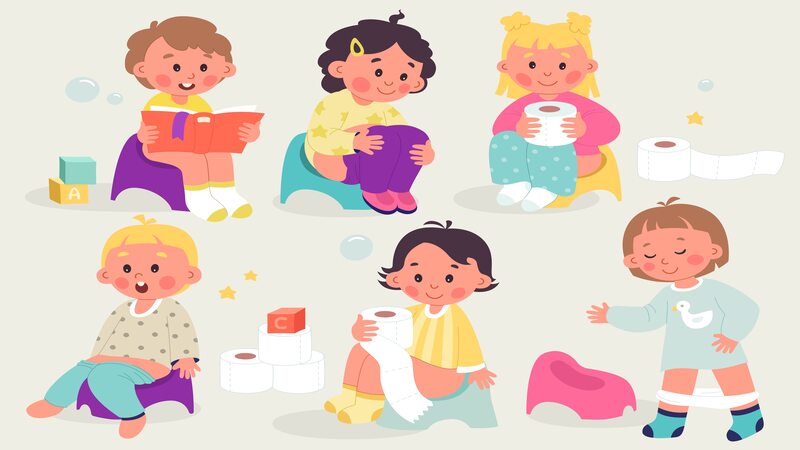
Successful accomplishment of potty training is one of the major developmental achievements in your toddler’s life. But for its quick success, you will need to understand when your toddler is ready to be potty trained. Don’t worry, you will not have to break the rock. Your toddler will give you signs of potty training readiness when the right time comes.
The process of teaching your toddler how to use the toilet in time will get much easier for you if you know when to start. Your venture towards teaching this vital life skill should be in line with your toddler’s physical and mental readiness. Wondering when to start or what are the signs to follow? Here is everything you need to know about signs of potty training readiness in toddlers.
When to Start Potty Training For Your Toddler?
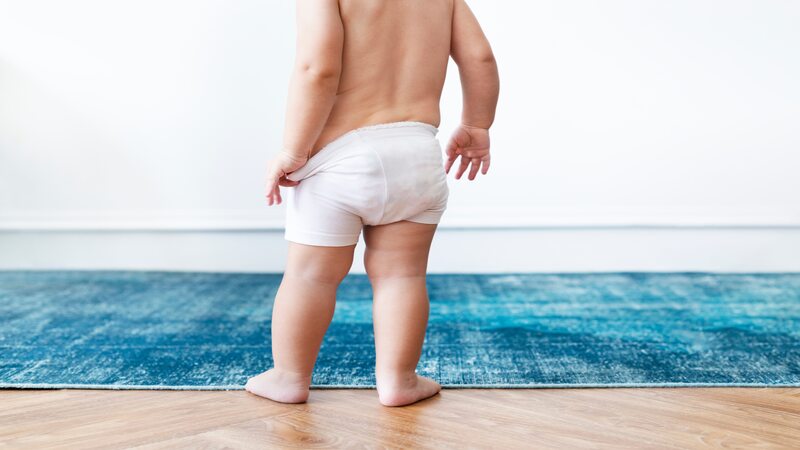
To start potty training for your toddler, you don’t have to strictly follow a timetable. The initiation of your potty training will depend on the readiness of your toddler. If your toddler shows irritation in pooping and peeing in diapers immediately after learning to walk then give them the training.
On the contrary, if the toddler fears the process of going to the bathroom then hold on. The age of starting potty training shifts forward over the period, as parents find it more useful to train a toddler of 24 to 30 months than 18 months (1). However, the exact time of inauguration will be entirely dependent on the developmental progress and needs of your toddler.
Signs Your Toddler is Ready For Potty Training
You will notice some changes in your toddler’s behaviors when they get ready for potty training. These certain behavioral changes will indicate that the toddler is now completely able to attain the massive developmental milestone of potty training. Here are the signs that you must look to be sure that your toddler is ready for potty training:
1. Toddler Stays Dry For Longer Time
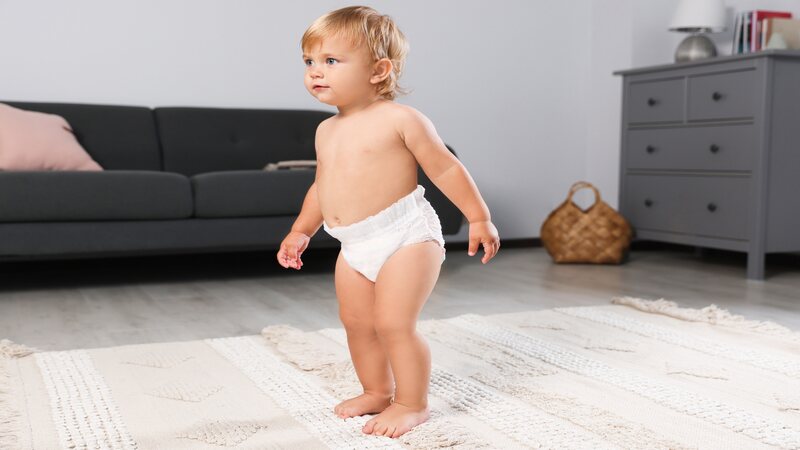
If you find your kid to stay dry for more than 1 to 2 hours during the day then it is the time. The capacity of the bladder and the muscles holding the urine in kids increases with time and their rate of accidental peeing or pooping decreases (2). You cannot potty train kids until they develop some sort of control on holding the pee or poop till you rush them to the bathroom.
2. They Can Follow Simple Instructions
The language recognition and communicative abilities in toddlers increase with their cognitive development (3). If your toddler is able to follow your simple instructions like “lift your leg”, or “remove your pants”, then it is the time. Otherwise, hold on for a few more weeks or months. Your potty training instructions will only be fruitful if the toddler can successfully process them in their mind.
3. Toddler is Showing Signs of Independence
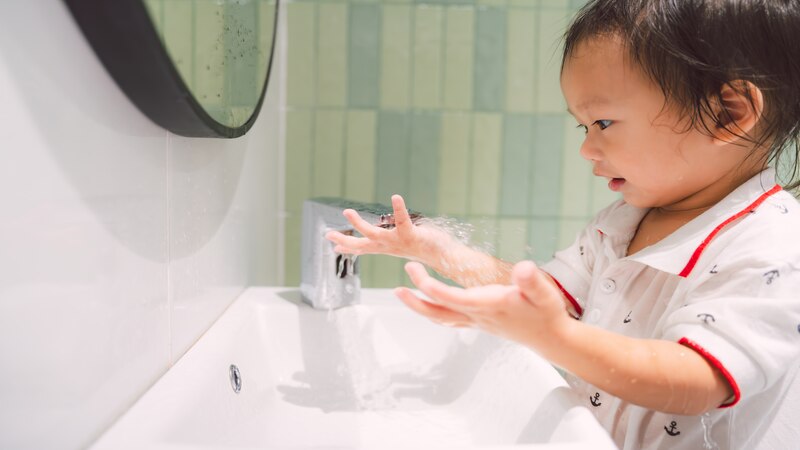
If your kid is giving you signs to practice independence then go ahead with your potty training lessons. Signs of independence in toddlers can be showing interest in self-feeding, wearing or removing clothes, throwing a ball or running without support. This desire to be independent is a vital sign that you must not miss.
4. Is Pooping on Schedule
As kids grow from infancy towards toddlerhood, their bowel movement gets regular and predictable (4). This will help you to decide when you should assist your toddler towards the bathroom for training.
5. Shows Interest in Potty Training Process
If your toddler follows you to the bathroom out of sheer curiosity then grab this opportunity. You can also kindle their interest by reading them fun stories and books about potty training.
6. Informs When They Pee or Poop
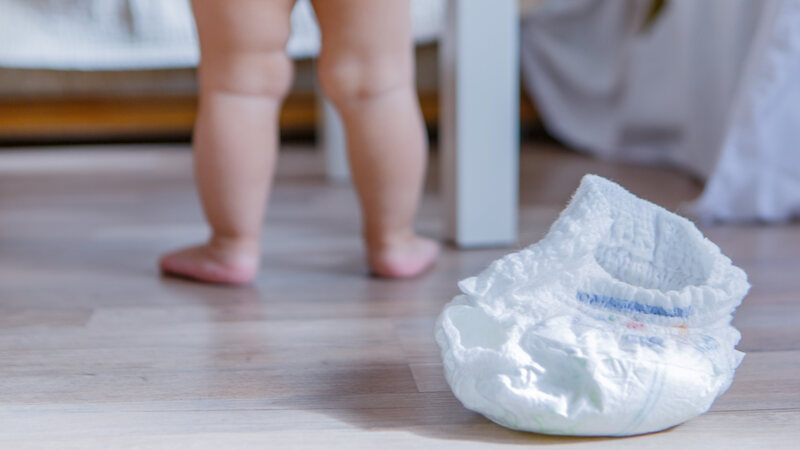
Toddlers can effectively put 2 to 3 words together to express themselves by the time they cross 2 years (5). So if you hear your kid utter words like “I pee” or “I go poop” then bingo!
7. Toddler Dislikes Being in Wet or Soiled Diaper
Kids develop a sense of their surroundings and their well-being from toddlerhood (6). This means a stinky or damp diaper will no longer please them. Whenever you find this distaste for diapers in your kid know that it is time.
8. They Can Undress Themself
Toddlers being able to undress independently is an important requirement for the success of potty training. Make them wear elastic-waist pants to ease the easy removal in times of need.
9. They Are Willing to Use The Potty
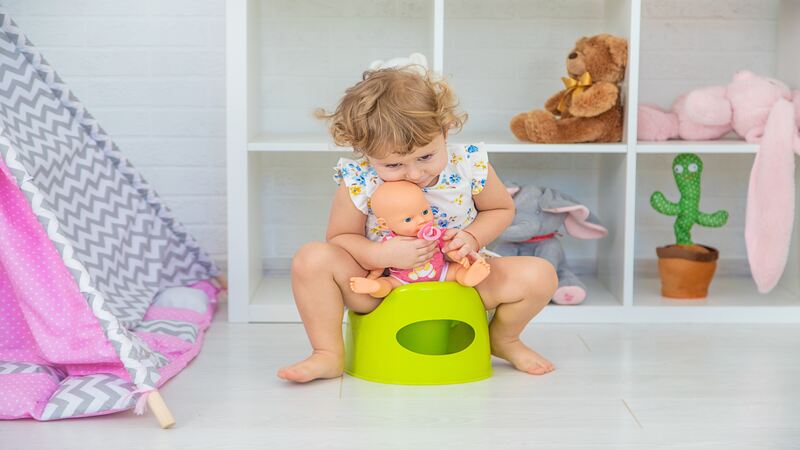
Potty training needs certain gross motor skills in your kid like walking, grabbing, and sitting still in the commode. So, if you find out your toddler trying to sit on the potty seat alone then it is the perfect time.
Potty training will not be a hectic process for you if you know the right time to begin. Look for these readiness signs in your toddler and you will crack it or flash it as you can say.
Signs Toddler is Not Ready For Potty Training
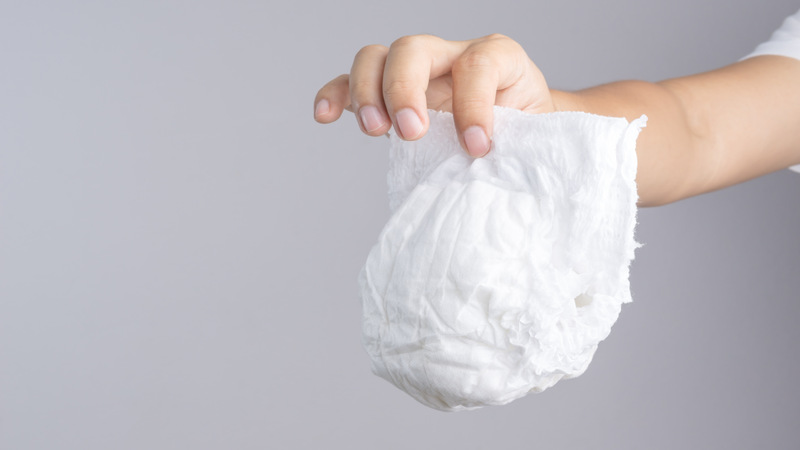
Along with the signs of readiness, it is equally important for you to know the signs when your toddler is not ready for potty training. Otherwise, it will result in unnecessary delay and frustration from both ends. The signs that your toddler is not ready for potty training can be:
- The toddler is not able to stay dry for over 1 hour
- The toddler is below 2 years old and lacks the linguistic and gross motor development necessary for grabbing the potty training lessons
- You have a recent shift and your toddler is getting accustomed to the new environment
- You have a new baby at home which does not permit you much time and attention to your toddler
- The kid is not willing to move past the diaper
- The toddler is not able to remove the pants or pronounce when in need to go to the bathroom
Under these situations, it is wise to hold back for some time. Start with your potty training tactics when you and your toddler are completely ready.
To conclude, you need to go with the learning pace of your toddler and never force them for potty training. Every toddler is unique. Hence, it is alright if they are not going in line with your expectations. Give them time and all your patience and you will get the results.
FAQ’s
1. What is an Indicator of Toilet Training Readiness?
One of the major indicators of toilet training readiness in toddlers is their ability to walk and sit still on the toilet seat. Without this ability, your potty training will not be successful. You can start practicing by letting your toddler sit and play on the potty chair.
2. What Are The Red Flags For Potty Training?
The red flags for potty training are having a fear of sitting on the potty chair and withholding pee or poop out of fear. You will have to normalize the process gradually by talking about it and even demonstrating it to your kid.
3. What is The Average Age to Start Toilet Training?
The average age to start toilet training can be anywhere between 24 to 30 months. Though some reports suggest 18 to 24 months to be the time, others indicate early intervention to be resulting in a prolonged hassle.
4. What is Physical Readiness For Potty Training?
Besides verbal cues, your toddler can give signs of physical readiness like walking towards the bathroom, sitting on the potty chair, etc. Physical attributions of grunting, getting a red face, and squatting while having a bowel movement also indicate potty training readiness.
5. Which Potty Training Method is Best?
It is best to make a fixed routine for potty training. Notice when your toddler has a bowel movement each day. Start your training 10 minutes earlier so that by the time your toddler feels the urgency you are completely ready to proceed.
References
- Denise M. MotaI; Aluisio J. D. BarrosII, IMestre. Médica nefrologista pediátrica, Programa de Pós-Graduação em Epidemiologia, Universidade Federal de Pelotas (UFPel), Pelotas, RS, Brazil, IIDoutor. Professor associado, Programa de Pós-Graduação em Epidemiologia, UFPel, Pelotas, RS, Brazil – https://www.scielo.br/j/jped/a/kgbgVbNsdLJxS7BNQyMDyMH/?lang=en
- H. Gil Rushton, MD – https://sci-hub.se/https://doi.org/10.1016/S0094-0143(21)01018-1
- Berna A. Uzundag, Aylin C. Küntay, Children’s referential communication skills: The role of cognitive abilities and adult models of speech, Journal of Experimental Child Psychology, Volume 172, 2018, Pages 73-95, ISSN 0022-0965, https://doi.org/10.1016/j.jecp.2018.02.009. – https://www.sciencedirect.com/science/article/abs/pii/S0022096517306598
- Mayo Clinic Health System, Sara Herrmann, M.D., Pediatric & Adolescent Medicine (Children), Primary Care – https://www.mayoclinichealthsystem.org/hometown-health/speaking-of-health/qa-constipation-in-children
- raisingchildren.net.au – https://raisingchildren.net.au/toddlers/development/language-development/language-1-2-years
- State Government Victoria, Department of Education and Early Childhood Development – https://ecka.org.au/wp-content/uploads/2023/11/Wellbeing-Newsletter.pdf
